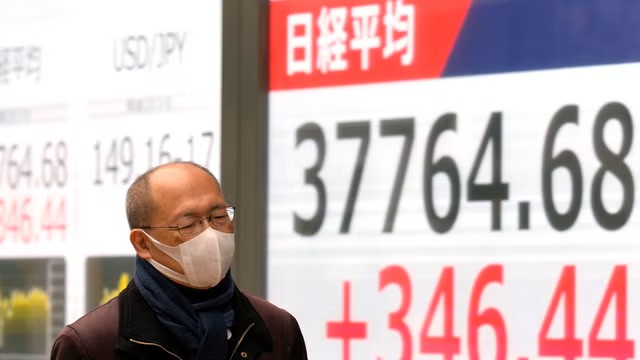Asian Markets Rebound as Trump Eases Some Tariffs
International International NewsPosted by NewAdmin on 2025-03-06 08:43:56 |
Share: Facebook | Twitter | Whatsapp | Linkedin Visits: 14

Asian shares rebounded on Thursday, following gains on Wall Street after President Donald Trump decided to ease some of his proposed tariff hikes. Trump announced a one-month exemption for U.S. automakers from the 25% tariffs on Mexican and Canadian imports, raising hopes that a full-scale trade war might be avoided. This decision led to optimism in global markets.
Japan’s Nikkei 225 index rose by 0.8% to 37,704.93, with Honda Motor gaining 2% and Nissan Motor rising 1.1%, though Toyota Motor saw a slight decline of 1%. Hong Kong’s Hang Seng index surged 3.3% to 24,362.68, driven by Beijing’s renewed commitment to boosting domestic consumer spending. The Shanghai Composite index gained 1.2% to 3,381.10. Meanwhile, South Korea’s Kospi increased by 0.7% to 2,576.16, but Australia’s S&P/ASX 200 fell 0.6% to 8,094.70. Taiwan’s Taiex and Thailand’s SET index also saw minor declines. On Wall Street, Ford and General Motors stocks surged more than 5%, contributing to overall market gains. The S&P 500 increased by 1.1% to 5,842.63, while the Dow Jones Industrial Average rose by 1.3% to 43,006.59. The Nasdaq composite climbed 1.6% to close at 18,552.73.
Despite the temporary relief, uncertainty remains as Trump has not withdrawn all planned tariffs, including additional measures against China set to take effect on April 2. His stance has created volatility in markets, with concerns about inflation and economic growth. U.S. manufacturers have expressed worries about the impact of tariffs on their business growth. Economic data released on Wednesday painted a mixed picture of the U.S. economy. ADP reported a slowdown in job growth, raising concerns ahead of the official employment report from the Labor Department. However, the services sector showed stronger-than-expected growth, though businesses cited concerns about trade policy uncertainty.
The fear of stagflation—where the economy slows while inflation remains high—has surfaced due to weaker-than-expected economic reports. If the U.S. economy weakens further, the Federal Reserve may consider interest rate cuts, but that could further drive inflation higher. In commodity markets, U.S. benchmark crude oil rose to $66.89 per barrel, while Brent crude climbed to $69.86. The U.S. dollar weakened against the Japanese yen, while the euro showed slight gains. While markets responded positively to Trump's tariff delay, the long-term impact of trade policies remains uncertain, with global investors watching closely.
Search
Categories
Recent News
- Hyderabad's Biryani Scam: When Food Delivery Meets Fraud
- RBI's UDGAM Portal: Hyderabad's Cyber Fraud Warning
- Hyderabad Gears Up for Presidential Visit: Traffic Advisory Issued
- Hyderabad Crypto Scam: Unraveling a Multi-State Fraud
- Cyber Scams Target Unsuspecting Citizens via RBI Portal
- Telangana's Tech-Driven Policing: Drones Take to the Skies
- RBI Governor Prioritises Digital Security: A Strategic Shift
- Hyderabad's Massive Anti-Drug Operation: 72 Foreigners Deported
Popular News
- Navigating IPO Market Dynamics Amid Volatility and Regulatory Changes
- Innovative Green Practices and Environmental Initiative
- Massive Worldwide Microsoft Outage Disrupts Multiple Sectors
- తెలుగుదేశం పార్టీ - పేదరికాన్ని నిర్మూలించడంలో వాగ్దానం
- Universities Embrace Remote Learning Technologies Amidst Ongoing Pandemic